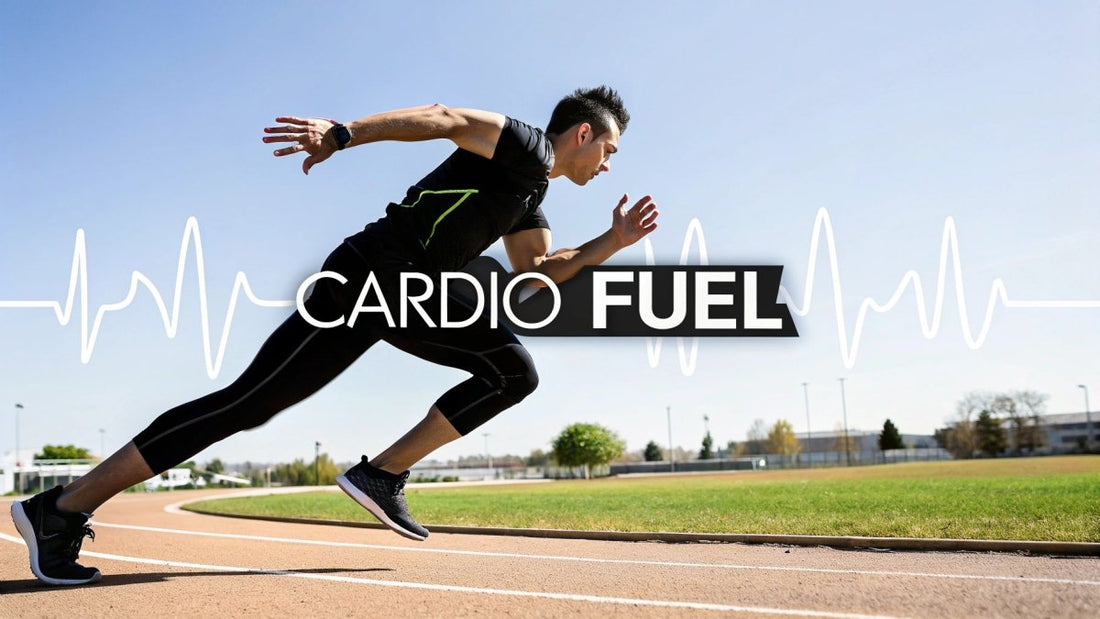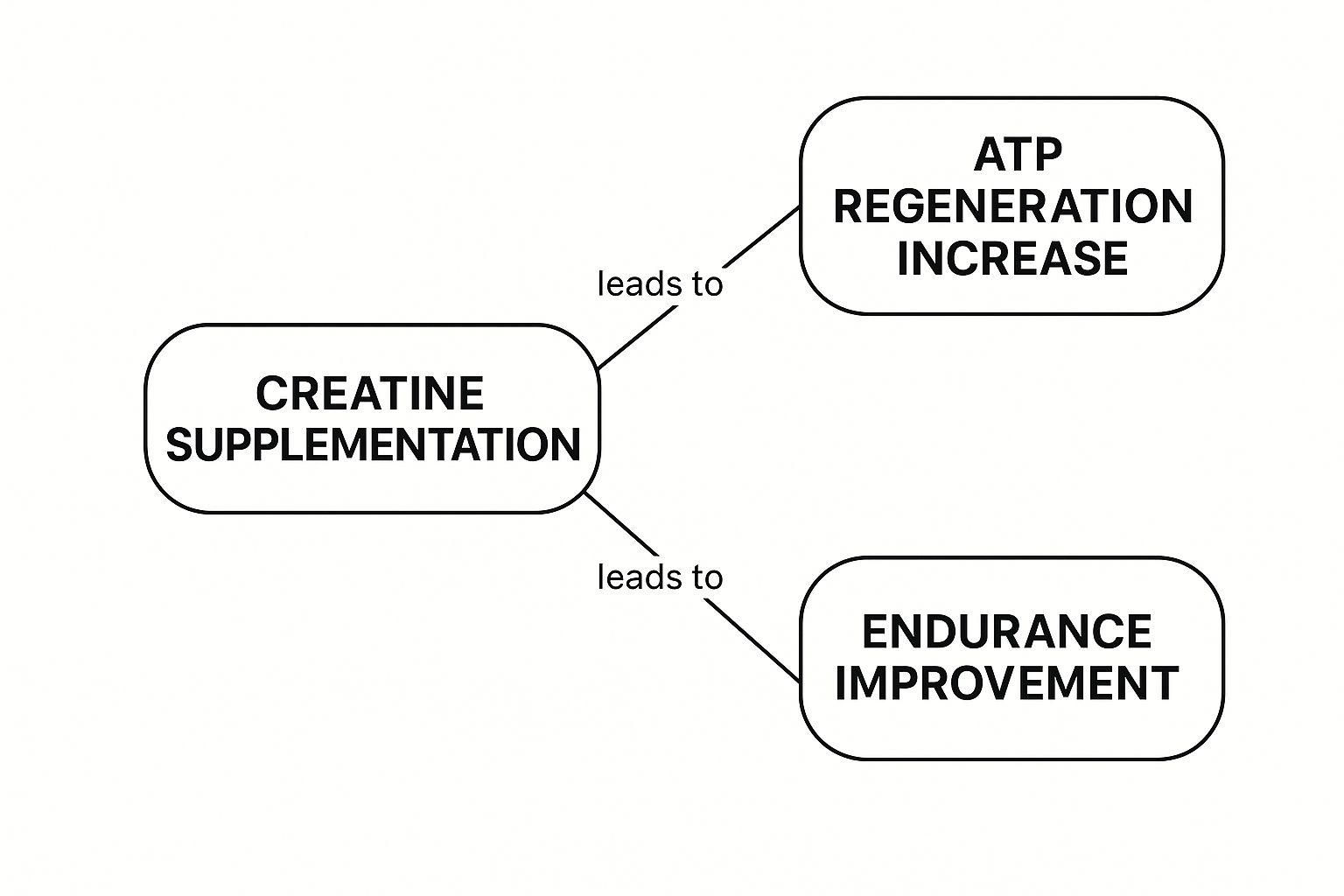
Creatine for Cardio Unlocking Endurance
Share
For a long time, creatine has been pigeonholed as a supplement strictly for bodybuilders and powerlifters. If you're looking for bigger muscles, you take creatine. But what if you're a runner, a cyclist, or a HIIT enthusiast? The answer is a resounding yes, creatine is a fantastic tool for cardio athletes.
Think of creatine as a cellular battery recharger. It provides that quick-snap energy needed not just for a heavy deadlift, but also for those make-or-break moments in your cardio sessions—like a final sprint to the finish line or a tough interval on the bike.
Can Creatine Really Boost Your Cardio?

It sounds a bit odd, right? Using a "strength" supplement to improve your endurance. After all, cardio is all about sustained, aerobic effort, while creatine is famous for fueling short, explosive movements. But this view is a little too black-and-white and misses the bigger picture of how endurance performance actually works.
Let's get real for a second. Think about your last tough run or ride. It probably wasn't just a slow, steady plod. You likely had to power up a steep hill, surge past another cyclist, or dig deep for the last 30 seconds of an interval.
Those moments are what separate a good workout from a great one, and they rely on the exact same explosive energy system that weightlifters tap into. This is where creatine comes into play.
Reframing Creatine as an Endurance Ally
At its core, creatine works by increasing your body's reserves of phosphocreatine. This compound is critical for rapidly regenerating adenosine triphosphate (ATP), which is the main energy source for your cells. For a cardio athlete, that means having more fuel in the tank for the crucial, high-power bursts that are sprinkled throughout any endurance activity.
So, what does that actually feel like? Here’s what athletes often notice:
- Better Interval Performance: You can push harder during the "on" phases of your HIIT workouts and feel ready to go again sooner during the "off" phases.
- Higher Lactate Threshold: Creatine can help you tolerate that muscle-burning sensation for longer, meaning you can hold a faster pace before you have to back off.
- Less Fatigue: With better energy production at the cellular level, you can help stave off that feeling of exhaustion during a long session.
- More Glycogen Storage: Creatine helps your muscles pack away more carbohydrates, essentially giving you a bigger fuel tank for those long-distance efforts.
Here’s a quick overview of how these benefits stack up for anyone focused on cardiovascular fitness.
Quick Look: Creatine Benefits for Cardio Athletes
| Benefit Area | How Creatine Helps | Primary Impact on Cardio |
|---|---|---|
| Energy Production | Rapidly regenerates ATP for immediate use. | More power for sprints, hill climbs, and final pushes. |
| Lactate Buffering | Helps delay the buildup of metabolic byproducts. | You can sustain a higher intensity for a longer duration. |
| Recovery | Reduces exercise-induced muscle damage. | Faster recovery between intense intervals and training sessions. |
| Fuel Storage | Enhances muscle glycogen storage. | A larger energy reserve for long-distance runs or rides. |
This table makes it clear: the benefits are tangible and directly applicable to improving your cardio performance, not just your bench press.
In short, creatine doesn’t just help you lift heavier; it helps you go harder. It’s the "nitro boost" you need to improve your top-end speed and power, which is a total game-changer for endurance athletes at any level.
By looking past its old-school reputation, many athletes are discovering how versatile creatine really is. The question isn't whether you should combine creatine and cardio, but how to do it smartly to crush your goals. This guide will walk you through the science, the right dosage, and how to put it all into practice.
How Creatine Fuels Your Endurance Engine
To really get why creatine works for cardio, we need to pop the hood and look at your body's energy systems. It’s true that most endurance activities like running or cycling are aerobic—they use oxygen for fuel. But what about the moments that really define your performance? The final sprint, a brutal climb, or a gut-busting interval? Those aren't aerobic.
Those moments are short, powerful, and anaerobic, meaning they demand energy way faster than your body can supply it with oxygen.
This is where your body’s built-in “nitro boost” kicks in, known as the ATP-PCr system. Think of Adenosine Triphosphate (ATP) as the actual energy currency your muscles spend to contract. When you go all-out, you burn through that cash fast. The problem is, you only have enough ATP stored for a few seconds of maximum effort.
Once that runs out, your body has to make more, and it has to do it now. It does this by breaking down a molecule called phosphocreatine (PCr). This chemical reaction rapidly churns out fresh ATP, letting your muscles keep firing on all cylinders. So, the more phosphocreatine you have packed away in your muscles, the longer you can sustain those critical bursts of power.
This visual below breaks down the direct line from creatine supplementation to this energy cycle, showing how it all leads to better endurance.

As you can see, taking creatine directly stocks up your ability to regenerate ATP. That's the core mechanism that helps you push harder and longer during those high-intensity moments.
Supercharging Your Anaerobic Power
Supplementing with creatine is like upgrading the machinery in your body’s energy factory. It saturates your muscles with the raw materials (creatine) needed to produce more phosphocreatine. With a bigger PCr fuel tank, you can top off your ATP levels faster and more often during your cardio workouts.
This isn’t just theory; it translates into real-world benefits you can actually feel.
- Better HIIT Performance: During High-Intensity Interval Training, you'll be able to go harder in the "work" phases and bounce back quicker during the "rest" periods. The result is a much more productive workout.
- Higher Lactate Threshold: You know that burning feeling in your muscles during an intense effort? That's from metabolic byproducts building up. By making your energy system more efficient, creatine can help buffer this, letting you hold a faster pace for longer before fatigue forces you to back off.
- A Stronger Finishing Kick: That last all-out sprint to the finish line or the final push over the crest of a hill depends entirely on the ATP-PCr system. Having more creatine in the tank means you've got more gas for a strong finish.
The bottom line is this: while your aerobic system handles the long, steady parts of your cardio, the ATP-PCr system—powered by creatine—is what carries you through the decisive, high-power moments that lead to breakthroughs.
Bridging the Gap Between Strength and Stamina
It’s a common myth that cardio performance is all about aerobic capacity. The truth is, the best endurance athletes have a powerful anaerobic system they can tap into when things get tough. A runner who can't surge to pass a competitor or a cyclist who fades on climbs will always be held back, no matter how great their base endurance is.
Creatine helps bridge that gap. By boosting your ability to perform repeated, high-intensity efforts, it improves your overall work capacity. Over time, this lets you train at a higher intensity, which then triggers even greater improvements in your aerobic fitness. It's a win-win.
Let's look at a real-world example. Imagine you're a cyclist doing a workout of five 60-second hill repeats.
- Without Creatine: By the third or fourth interval, your power output starts to tank. You’re struggling to keep the pace because your immediate energy stores are draining faster than they can be refilled.
- With Creatine: With fully saturated muscles, you're regenerating ATP more effectively between each climb. You might find you can hold a higher power output for all five intervals—and maybe even feel good enough to throw in a sixth.
This ability to perform more high-quality work during training is what drives long-term progress. Over weeks and months, these small improvements in workout quality stack up, compounding into significant gains in your overall cardio performance. The science is solid: creatine for cardio isn’t just a concept; it’s a direct physiological boost to the very energy system that fuels your toughest efforts.
Supporting Your Heart Beyond Performance

We've talked a lot about what creatine can do for your cardio performance, but the story doesn't end there. The latest science is starting to show that creatine’s benefits reach deep into your cardiovascular system, supporting long-term heart wellness in ways most of us have never even considered.
This isn't just about shaving seconds off your mile time. It's about taking care of the most important muscle you have: your heart. Just like the muscles in your legs, your heart is an engine that needs a constant, reliable supply of energy to keep pumping strong. By boosting cellular energy, creatine might just be a key player in keeping that engine running smoothly for the long haul.
Enhancing Blood Vessel Health
One of the most exciting new frontiers is creatine's impact on endothelial function. Think of the endothelium as the super-smooth inner lining of all your blood vessels. When it's healthy, your arteries are flexible and can easily widen to let blood flow through, which is a massive part of what keeps your blood pressure in check.
If that lining gets damaged or stiff, it’s like trying to push water through old, rigid pipes instead of flexible hoses. Your heart has to work much harder. Creatine seems to step in by fighting off oxidative stress and making nitric oxide more available—two key factors that help your blood vessels relax and open up.
A small but fascinating pilot study on older adults really drove this point home. After only four weeks of taking creatine, they saw big improvements in how flexible their arteries were. The results were on par with other well-known heart supplements like CoQ10. This is huge! It suggests creatine could be a powerful tool for keeping our circulatory system healthy.
Creatine’s ability to improve endothelial function could be a game-changer. It shifts our view of this supplement from just a muscle-builder to a real ally in maintaining a healthy, responsive cardiovascular system as we age.
The Impact on Blood Pressure and Heart Rate
Of course, any serious endurance athlete keeps a close eye on their resting heart rate and blood pressure. A common worry is whether creatine will throw those numbers out of whack. The good news? The overwhelming majority of research shows that for healthy people, creatine is perfectly safe and doesn't negatively affect these vital signs.
Sure, some studies might see tiny fluctuations here and there, but they’re almost always well within a normal, healthy range. For example, a trained athlete’s heart rate might bump up a few beats per minute, but it's more of a sign of metabolic adjustment than any kind of cardiac stress.
- Blood Pressure: Most studies agree that creatine doesn't cause any clinically significant spikes in blood pressure in healthy individuals.
- Heart Rate: You might see some minor variations, but they aren't considered harmful and don’t pose a risk to your heart's safety.
At the end of the day, creatine is just one piece of the puzzle. It works best as part of a bigger strategy that includes smart training and a heart-healthy diet. For a complete blueprint on fueling your body, check out our guide on nutrition for endurance athletes.
When you combine smart supplementation with the right food and consistent effort, you're not just getting faster—you're building a truly resilient cardiovascular engine that will serve you for years to come.
How Creatine Affects an Athlete's Heart Rate
For most endurance athletes, a low resting heart rate is a badge of honor. It’s a sign that your cardiovascular system is a finely tuned machine, a condition known as athletic bradycardia. It’s the result of countless hours spent on the road, track, or trail. So, how does a supplement famous for explosive power fit into this picture?
To really get what creatine does, we need to look past the weight room and see how it subtly shifts your body's internal chemistry. When you start taking creatine, you're not just giving your muscles more raw energy; you're tweaking how your entire system runs, and that includes the rhythm of your heart.
Some athletes report a small bump in their resting heart rate after they start on creatine, which can feel a little weird. If you've worked hard for that low number, seeing it creep up might feel like you're going backward. But this slight change is almost never a red flag.
Why Would My Heart Rate Go Up?
That small increase in heart rate isn't a sign of cardiac stress or something being wrong. It's simply your body adjusting to a new metabolic state. With more creatine phosphate floating around, cellular processes—including those in your heart tissue—get a little jolt and operate differently.
Understanding this adjustment is key if you're thinking about using creatine for your cardio training. You have to interpret these little changes correctly and not mistake a normal metabolic response for a bad side effect.
So, what does the science actually say?
Studies comparing creatine users to non-users give us a pretty clear idea. One study zeroed in on bodybuilders and found some interesting results. The bodybuilders not taking creatine had an average resting heart rate of about 62 beats per minute (bpm)—classic athletic bradycardia. The group taking creatine, however, averaged around 70 bpm. While that’s higher, it's still well within a healthy, normal range. You can dig into the specifics yourself in the original cardiac effects of creatine study.
What this tells us is that creatine supplementation might slightly dial back the extreme bradycardia you see in highly trained athletes. It’s not causing a dangerous heart rate spike; it’s just nudging it closer to a more standard—but still very healthy—baseline.
Putting It All Into Context
It's really important to see these numbers for what they are: minor tweaks. A resting heart rate of 70 bpm is still fantastic for any fit person. This shift is most likely tied to changes in your blood volume and overall metabolic rate, which are totally normal responses when you start loading creatine.
Think of it this way: your car's engine might idle at a slightly different RPM after you get it tuned up for better performance. That doesn't mean the engine is sick. It just means it's running under a new, optimized set of rules. The same idea applies to your heart on creatine.
Here's how to think about this potential change:
- Look at Your Performance: Are your interval sprints getting stronger? Do you feel like you're recovering faster between hard efforts? Those are the metrics that really show if creatine is working for you, not a few beats on your heart rate monitor.
- Watch the Trend, Not the Day: Don't get hung up on a single day's reading. Keep an eye on your heart rate trend over a few weeks. You'll probably see it level out once your body gets fully used to the supplement.
- Hydrate, Hydrate, Hydrate: Creatine is known for pulling water into your muscles. Staying on top of your hydration is absolutely critical to maintain healthy blood volume and make sure your heart isn't working any harder than it needs to.
At the end of the day, the reason to take creatine for cardio is to boost your training capacity and go longer. Your resting heart rate might tick up a bit, but the real prize is in the performance gains—stronger pushes, a higher lactate threshold, and quicker recovery. That tiny physiological shift is just part of the deal that helps you unlock that next level of endurance.
Your Creatine Plan for Cardio Training

Alright, we’ve covered the science behind how creatine can give your cardio a serious edge. Now, let's translate that knowledge into a straightforward, practical plan you can actually stick to.
First up, what kind should you buy? The supplement aisle can be confusing, but the answer here is simple. Stick with creatine monohydrate. It's the most researched, effective, and affordable form on the market. Decades of studies confirm it’s the gold standard for a reason—don’t get bogged down by fancy marketing for other versions.
Choosing Your Dosing Strategy
Next, you need to decide how you'll start taking it. You have two solid options: a loading phase for faster results or a simple maintenance dose for a more gradual approach.
A loading phase is the express lane to saturating your muscles. You'll take a higher dose for the first 5-7 days and then drop down to a smaller daily amount. This gets you to peak levels quickly.
The other method is to start with a standard maintenance dose from day one. It's a slower build—taking about 3-4 weeks to reach full saturation—but the final destination is the same. This is a great choice if you have a sensitive stomach or just prefer a simpler routine.
To help you decide, here's a quick breakdown of the two main protocols.
Creatine Dosing Strategies for Cardio Athletes
| Strategy | Daily Dosage | Duration | Best For |
|---|---|---|---|
| Loading Phase | 20-25 grams (split into 4-5 doses) | 5-7 Days, then drop to maintenance | Athletes needing rapid results for an upcoming event or training block. |
| Maintenance Dose | 3-5 grams | Ongoing (takes 3-4 weeks to saturate) | Anyone prioritizing simplicity, consistency, and avoiding potential GI upset. |
Ultimately, both paths lead to the same result. For most endurance athletes, the steady maintenance dose is often the most practical and hassle-free way to go.
Daily Dose and Timing Details
Once you're past the initial phase (or if you start with maintenance), the magic number is 3 to 5 grams of creatine monohydrate per day. This is the scientifically-backed dose that keeps your muscle stores topped off, which is perfect for runners, cyclists, and anyone else focused on endurance.
So, when should you take it? Before your workout? After? Honestly, it doesn't really matter. Consistency is far more important than timing. Creatine's benefits come from keeping your muscles saturated over time, not from an immediate pre-workout boost. Just find a time that fits your daily routine—whether it's in your morning coffee or your post-run shake—and stick with it.
The Non-Negotiable Rule: Hydration
If you take away just one thing, let it be this: you must drink enough water. Creatine works by drawing water into your muscle cells, which is a key part of how it improves performance.
But this means your body's overall need for fluids goes up. Skimping on water can lead to dehydration, cramping, and a drop in performance—exactly what you’re trying to avoid. Think of water as the key that unlocks creatine’s full potential.
To really get the most out of this combination, pairing proper supplementation with targeted stamina training exercises for improved endurance creates a powerful synergy for performance gains. If you're looking for more sport-specific advice, our guide on creatine for cyclists offers a deeper dive.
Creatine's Role in Clinical Heart Health
Creatine’s story doesn't end at the gym or the running track. It’s now making waves in clinical research, where scientists are exploring its potential to help people dealing with serious health conditions like chronic heart failure.
This isn't about athletic performance. It's about fundamental human function. When someone has a weakened heart, the muscle struggles to pump blood effectively. Simple activities, like walking up a flight of stairs, can become completely draining.
The thinking here is fascinating. Researchers aren't looking at creatine as a cure for the heart itself, but as a way to support all the other muscles in the body. If your leg muscles work more efficiently, they don't demand as much from an already struggling heart. It's a clever way to ease the overall burden.
Improving Strength and Daily Function
For a patient with heart failure, being able to walk a little farther without getting winded is a massive win. This is where creatine's knack for topping up cellular energy truly shines in a therapeutic light. By helping the body's skeletal muscles do their job better, it can indirectly take some pressure off the cardiovascular system.
And this is more than just a theory. An exploratory study gave patients with heart failure 5g of creatine monohydrate daily for three months, and the results were genuinely impressive.
On average, these patients were able to walk nearly 49 meters farther in a 6-minute test. Just as importantly, they felt like the exercise was less difficult. You can read the full research about these heart health findings to see the data on how it also boosted their quality of life scores.
In essence, by making the body's other muscles stronger, creatine can help lighten the load on the heart. This allows patients to do more in their daily lives, which is a huge factor in their overall well-being.
A Supportive, Not Curative, Role
Let's be crystal clear about this: Creatine is not a treatment for heart disease. It's being studied as a complementary therapy—something that can work alongside standard medical care to help manage symptoms and improve a person's ability to get through their day.
Its potential really boils down to a few key benefits for these patients:
- Boost muscle endurance: Helping them sustain light activity for longer periods.
- Reduce perceived exertion: Making everyday tasks feel less like a struggle.
- Enhance quality of life: Giving them back a degree of independence and physical capability.
The ongoing research into creatine's clinical uses is a powerful reminder of just how fundamental it is to our body's energy systems. While an athlete might use it to hit a new personal best, that same mechanism could one day help a patient regain the strength to simply live a fuller life.
Common Questions on Creatine for Cardio
It's smart to ask questions before adding anything new to your routine, especially when you're fine-tuning your cardio performance. When it comes to creatine, a few of the same questions pop up again and again.
Let's tackle them head-on so you can decide if it's right for you.
Will Creatine Make Me Gain Weight and Slow Me Down?
This is probably the biggest hang-up for any runner or cyclist, and I get it. The short answer is yes, you might see the scale tick up by 1-3 pounds when you first start.
But here’s the crucial part: it’s not fat. It's just water being drawn into your muscles. This process, called cellular hydration, is actually a good thing for performance. You're gaining functional muscle fullness, not dead weight. For almost everyone, the trade-off—a massive boost in power and recovery for a pound or two of water—is well worth it.
Is Creatine Safe for Long-Term Use?
Absolutely. Creatine monohydrate is one of the most researched supplements on the planet, and its safety record is rock-solid. We're talking about decades of studies that have consistently found no harmful effects on the heart, kidneys, or other organs in healthy people who stick to the recommended doses.
The science is settled: for healthy individuals, creatine is safe to take continuously. Of course, if you have any pre-existing kidney or heart issues, the smart move is always to chat with your doctor first.
Can I Mix Creatine with My Pre-Run Coffee?
Go for it. There was an old theory floating around that caffeine could interfere with creatine, but newer, better research has pretty much put that myth to rest.
Plenty of athletes (myself included) combine them daily to get a powerful one-two punch of energy from two totally different sources. Just listen to your body and make sure you're staying hydrated, since both can make you pee a bit more. For most people, it's a winning combination.
Tired of dealing with messy powders before your run? Smash.com makes premium creatine gummies that pack your full 5g dose into a few tasty bites. See our flavors and make your supplement routine easier at https://smash.com.